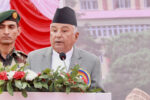KATHMANDU: Former Chief Justice Kalyan Shrestha has emphasized the importance of raising awareness about light pollution.
Speaking at a research presentation titled “In the Shadow of Progress: Addressing the Impacts of Light Pollution,” jointly organized by the Institute for Strategic and Socio-Economic Research (ISSR), and Khabarhub at the Pavilion Hall in Durbarmarg, he stressed that it is crucial to adopt a multi-dimensional approach to address the issue, ensuring a balance between progress and environmental sustainability.
“It is essential to recognize the negative consequences of unchecked light usage and optimize how we use lighting to prevent further harm,” he said at the presentation by Akash Shrestha, who shed light on the multifaceted effects of light pollution.
Shrestha’s presentation highlighted how light pollution negatively impacts ecosystems, human health, safety, the economy, and even cultural heritage, raising concerns about the consequences of modern development.
The presentation base don research also identified three primary manifestations of light pollution: glare, trespass, and skyglow.
Glare occurs when unshielded lights cause discomfort or reduce visibility, while trespass refers to light spilling into areas where it is not wanted.
Skyglow, the most noticeable form, brightens the night sky, making it difficult to view stars and other celestial bodies.
Beyond the environmental and health concerns, light pollution also has significant economic repercussions.
According to the research, up to 30 percent of outdoor lighting is wasted in some regions.
In Nepal, this inefficiency results in approximately 42 GWh of wasted electricity annually, costing the country hundreds of millions of rupees, Shrestha said in his presentation.

This waste contributes to higher energy bills, unnecessary carbon emissions, and places a strain on electricity providers, according to him.
Additionally, Dr. Bindu Nath Lohani, an environmental expert, highlighted how developed countries have begun to adopt practices to minimize unnecessary lighting, especially in urban, ecologically, and culturally protected areas.
He suggested that light pollution could be integrated into Environmental Impact Assessment (EIA) reports for future projects, ensuring that the issue is systematically addressed in development plans.
Biraj Bhakta Shrestha, Member of Parliament, proposed that light output should prioritize “lower noise and higher output” instead of the current trend of “higher noise and lower output.”
He advocated for research-based awareness campaigns and discussions at the local government level to address light pollution effectively.
Deepak Raj Joshi, CEO of the Nepal Tourism Board, offered an optimistic perspective, suggesting that light pollution could create new opportunities in the tourism sector.
“Star gazing could be promoted as a unique aspect of Nepal’s tourism, adding an astronomical dimension to our ecological and adventure tourism offerings,” he noted.
Suresh Bhattarai, Chairman of the Nepal Astronomical Society (NASO), also supported the idea of promoting awareness campaigns and astro-tourism as a sustainable and eco-friendly solution to combat light pollution.
It should be noted that efforts to combat light pollution are gaining traction globally.
For instance, France has implemented restrictions on upward lighting, and South Korea has established policies to prevent light pollution.

Speakers viewed that Nepal could adopt similar strategies, such as setting standards for outdoor lighting, incorporating light pollution into EIAs, and fostering public awareness through campaigns.
Shrestha, the lead researcher, concluded by stressing that light pollution does not have to be an inevitable consequence of development.
“With thoughtful planning and smarter use of lighting, communities can strike a balance between development and environmental stewardship,” he said. “We must act now, before the costs of inaction become irreversible.”
In the face of rapid urbanization and technological advancement, it is clear that a rethinking of how we light our world is necessary, he added.
According to him, tThe hope is that through careful planning and awareness, Nepal and the world can ensure that artificial light serves its intended purpose without overshadowing the stars above.
The program was participated by distinguished audience including academics, environmentalists, and policymakers.









Comment